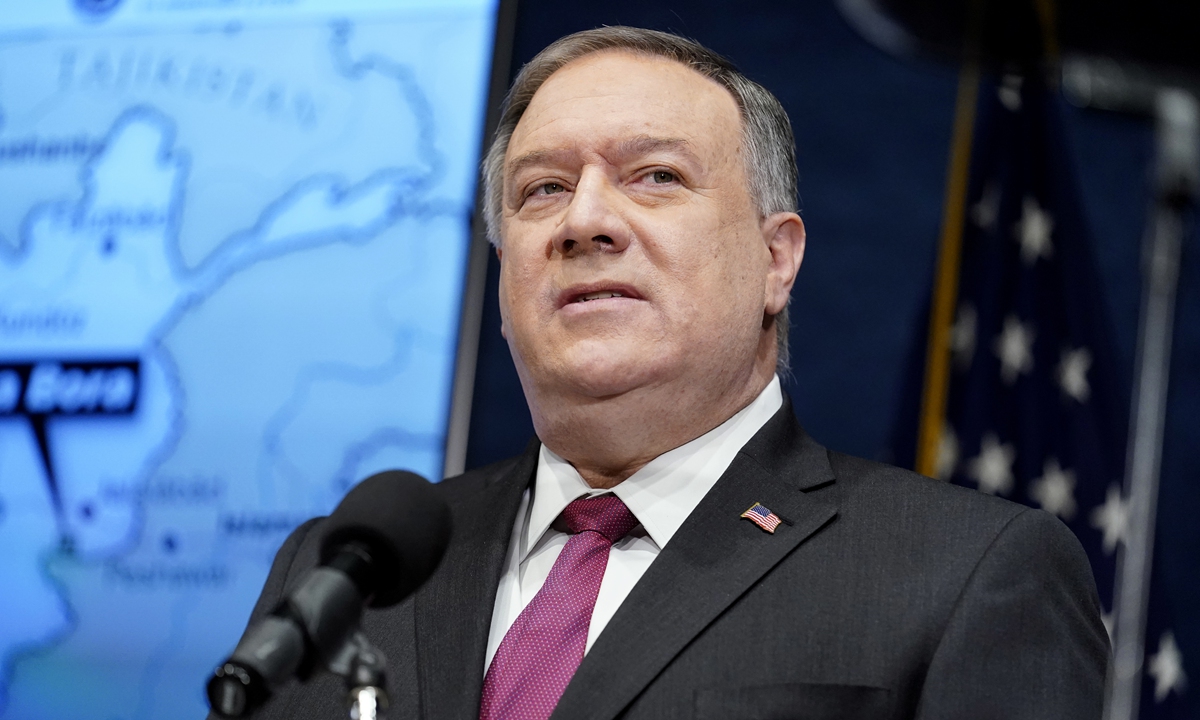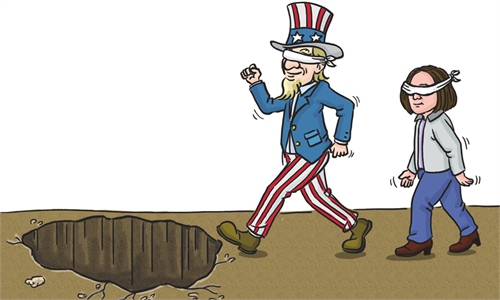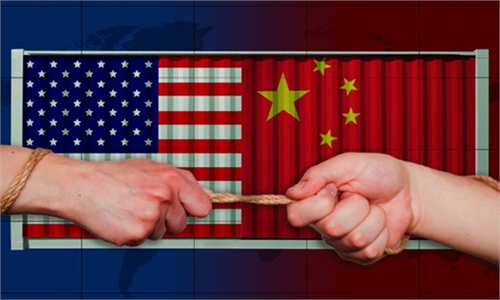Taiwan affairs office supports sanction on US politicians; Xinjiang conference ‘hammers last nail’ into coffin of ‘poisonous legacy’ of Pompeo

Mike Pompeo Photo: AFP
The Taiwan Affairs Office of China's State Council and the government of Northwest China's Xinjiang Uygur Autonomous Regions lammed former US Secretary of State Mike Pompeo over bad behavior on the Taiwan question and his smear against Xinjiang, as China announced sanctions on 28 anti-China US politicians on Wednesday night, including Pompeo.
The Taiwan Affairs Office expressed firm support on Thursday for the sanctions on the relevant US personnel who have behaved badly on the Taiwan questions.
"The Taiwan Democratic Progressive Party authorities have colluded with Pompeo and his like and made crazy provocations to seek secessionism, acting as pawns of anti-China forces and betraying national interests," said Zhu Fenglian, spokesperson of the Taiwan Affairs Office of the State Council.
The Xinjiang government also strongly denounced and rejected a series of lies from Pompeo on Xinjiang-related issues at a press meeting on Wednesday, saying his accusation of the Xinjiang government over "forced labor, religious repression and genocide against Uygurs" is sheer nonsense, and it is a fact that Xinjiang has seen social stability, economic growth and significant improvement in people's livelihoods.
Xu Guixiang, vice minister of the publicity department of the Xinjiang government, said the press conference was meant to "hammer the last nail" into the coffin of the "poisonous political legacy" of Pompeo, who takes pride in "lying, cheating and stealing" and has been acting like a mad dog barking nonsense while attacking Xinjiang in his last days in office.
In response to Pompeo's allegation on Tuesday that Xinjiang's policy on Muslims constitutes "crimes against humanity" and "genocide," Xu said the accusations were totally sinister lies, as the fact is the population of ethnic minorities, including Uygurs, has been increasing consistently.
According to statistics presented by the Xinjiang government, from 2010 to 2018, the permanent resident population of Xinjiang rose from 21.8 million to 24.9 million. Specifically, the Uygur population rose from 10 million to 12.7 million, an increase of 25 percent.
The data shows that the growth rate of the Uygur population is not only higher than that of the population in Xinjiang in general, but also higher than that of the population of other ethnic minorities, and significantly higher than that of the Han population.
"Is there any place around the world that could bring about this rocketing increase in a population after so-called 'genocide?'" Xu asked.
There is no "forced sterilization" at all, he said, noting that Xinjiang implemented the family planning process in accordance with the law, and prohibits any illegal activities such as late-stage abortion, compulsory sterilization and forced pregnancy tests.
As for Pompeo's accusation on so-called forced labor, detainment and repression against Uygurs, Xu said it is groundless and malicious fabrication and an ill-intentioned smear against Xinjiang.
He said the vocational education and training centers that Pompeo claimed to be "detention camps" are, in fact, educational and training facilities lawfully established during a period when terrorist attacks frequently occurred in Xinjiang, which is the same as the UK's Desistance and Disengagement Program and deradicalization centers in France.
Refuting Pompeo's claim that Xinjiang's restriction on ethnic minorities' freedom violates human rights, Xu presented a list of statistics proving that people of all ethnic groups in Xinjiang have a "growing sense of fulfilment, happiness and security."
This includes the fact that Xinjiang has not seen a violent, terrorist case for the past four years, the gross domestic product in the region grew at an average annual rate of 7 percent from 2014 to 2019 and 3 million impoverished households in over 3,600 poor villages of 32 poor counties have been lifted out of poverty in Xinjiang.


